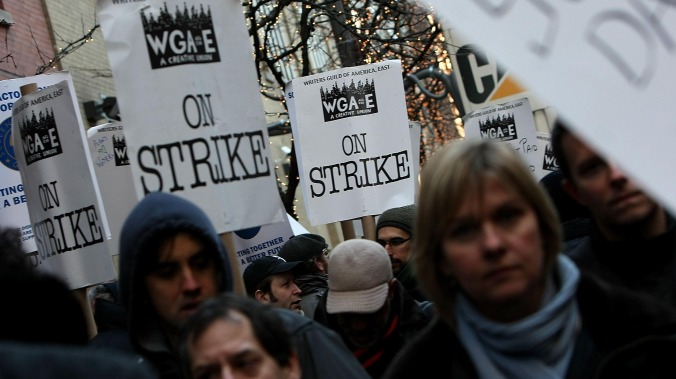Ahead of the strike, writers fromThe Bear, CSI: Vegas, and more tell us what it's really like behind the scenes
Writers from across the entertainment industry have been sharing their experiences online. The A.V. Club talks to some about writing in the streaming era

From the outside, writing for television seems like a prestigious and glamorous job. These are the people working behind the scenes to create Hollywood magic. They’re the people who come up with the stories everyone’s talking about around the water cooler (or, maybe more accurately, on Slack). We might assume that those people enjoy, if not fame and fortune, at least comfort and stability. Yet that’s increasingly not the case—even for writers working on a bona fide, critically-acclaimed hit series.
“I have friends who believe, ‘Oh, Alex worked on The Bear, Alex is rich now. Alex can buy a car.’ And you know, I’m not. I’m broke,” writer Alex O’Keefe tells The A.V. Club. “[When] I won the WGA Award for The Bear for Outstanding Comedy Series, I had a negative bank account. My suit was bought by my family and friends, and my bowtie was bought on credit. All that glitters is not gold.”
O’Keefe is one of many members of the Writers Guild of America who took to Twitter to share his industry experience in the lead-up to the strike vote. Those who spoke up come from all over the industry—people who write for shows like Abbott Elementary, Shadow And Bone, Patriot Act With Hasan Minhaj, XO Kitty, Roswell, New Mexico—and from every level of the business, from staff writer to showrunner. “Fun fact, when we made the YJ pilot, Bart [Nickerson] and I made a 40K production fee, split between the two of us, minus commissions (25%) and taxes, for 8 months of work,” Yellowjackets co-creator Ashley Lyle tweeted, shocking even her star Melanie Lynskey. (“The main thing any of us have to go on when choosing a project is the quality of the script. It’s everything,” Lynskey herself tweeted in support of the WGA. “There is no industry without writers. They deserve to be able to make a living!”)
Some writers have used their social media to help the average viewer understand how the state of television writing has fallen below equitable standards. Ashley Nicole Black (A Black Lady Sketch Show) and Brittani Nichols (Abbott) posted explanations about the lack of residuals in the streaming era. CSI: Vegas staff writer Dave Metzger shared that his experience in one of the dreaded streaming “mini rooms” ultimately led to being so underpaid that he fell behind on paying his WGA dues; despite rising to the level of staff writer, he’s had to take jobs outside the industry or accept work beneath him on the ladder to stay afloat.
“There are a handful of writers who make huge amounts of money. But a lot of us are struggling to make ends meet, and increasingly need to work other jobs just to afford rent and groceries,” Metzger shares with The A.V. Club. “I know many incredible writers who have been forced out of the business simply because they couldn’t make rent anymore. And, anecdotally, writers of underrepresented identities are disproportionately affected by these changes.”
With a historically high turnout and an overwhelming majority of guild members voting to authorize the WGA strike, negotiations with AMPTP (the Alliance of Motion Picture and Television Producers) will continue through May 1, when the current WGA contract expires. If the two groups don’t reach an agreement, the strike will be on—and these writers are explaining just why they voted in favor of that outcome.
The state of television in the streaming era
The “Writers Strike for Dummies” explanation of the current state of TV can be boiled down to this: profits are high and budgets are up, but writers are making less than ever. According to the WGA, half of all TV series writers are working for the guild’s Minimum Basic Agreement rate, regardless of their level of experience in the industry. And that MBA hasn’t been adjusted for inflation.
Plus, despite the fact that there’s more television than ever, there’s somehow less work. That’s because of the rise of miniseries and short-episode seasons. Writers are only being paid for 8-10 episodes of work. “[It] becomes, instead of a career of writing, it becomes a series of short-term gigs where the money you get you have to stretch out, and stretch out, and stretch out to make it for an entire year,” O’Keefe says. “And writers are going months, years, between projects.”